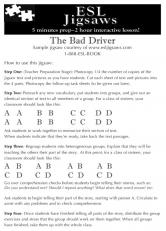ESL Jigsaws
5 Minutes Prep - 2 Hour Interactive Lesson!
Viewing entries tagged with 'free handout'
Father's Day Reading for Low Beginners
Not all countries celebrate Father's Day (or even Mother's Day) so it's a nice tradition to teach students about. If you have adult students, even if they don't plan to celebrate, they may be surprised to get a card their son or daughter has made in elementary school.
Garage Sales & Thrift Stores
It's summer and I'm back on the topic of second hand shopping. If you are teaching English to new immigrants, they may see something as they walk around their neighbourhoods at this time of year that they don't have in their home countries: garage sales. Likewise, they will likely come across thrift stores or flea markets in their neighbourhoods.
Writing About Household Repairs
I'm a big fan of using picture dictionaries to teach ESL, particularly to beginner and intermediate levels. Oxford Picture Dictionary, Heinle, Word By Word, I use them all. While they are all excellent and worth purchasing, my favourite is the Oxford Picture Dictionary because the pictures are so clear and pleasing. They also have different levels.
Bargaining Language & Soft Skills
Bargaining (or haggling) takes place all over the world. North Americans often think of it as restricted to places like flea markets or garage sales, when in fact bargaining takes place in a wide variety of business transactions. Think of the negotiation involved in the purchase of expensive items, such as cars or real estate.
Mother's Day
Many teachers who teach English as an additional language are mothers. In the spirit of thanks to mothers everywhere, I'm sharing a couple pages from my low beginner holidays book for free, to use in your class. I hope you find them useful.
Expanding on “Where Do You Live?
“Where do you live?” is one of the personal info questions teachers start with when teaching absolute beginner ESL. Once students have moved past the absolute beginner stage, it’s fun to move beyond that question and get really specific. Where in the world do you live? Where are you now?
Page Directions for Low Beginner ESL
I've created an interactive activity for low beginner ESL to practice page directions. You'll find your class runs smoother when you can draw students' attention to where the class is looking on the page you're working on and make sure everyone is following. You're welcome to download my materials for free to use in your classroom.
Teaching Family to Level One
Were you aware that not all languages use the same one word for father's sister and mother's sister the way English uses aunt? Likewise, many languages have different words for the grandmother from your father's side and the grandmother from your mother's side. Learning about these differences in nomenclature makes teaching a family unit in an ESL classroom an interesting experience.


